Quakers and Slavery: A Walk to the Underground Railroad Tree
Today, we’re going on a walk to see a tree that has been a witness to the Underground Railroad. It’s a tree that sheds light on Quakers and slavery. A tree that’s been around as long as the United States.
So, put on your sneakers and take a walk with our producer Georgia and historian James Shields as we uncover the rich history of brave Africans seeking freedom and the Quakers who helped them through these North Carolina woods.
Subscribe so you don’t miss an episode!
Join us for our upcoming Zoom event: Help! There’s An Election Coming! on Tuesday, Oct. 1, 2024 at 7 p.m. ET. Learn more and register for this free event.
Don’t forget to share your thoughts on this episode below.
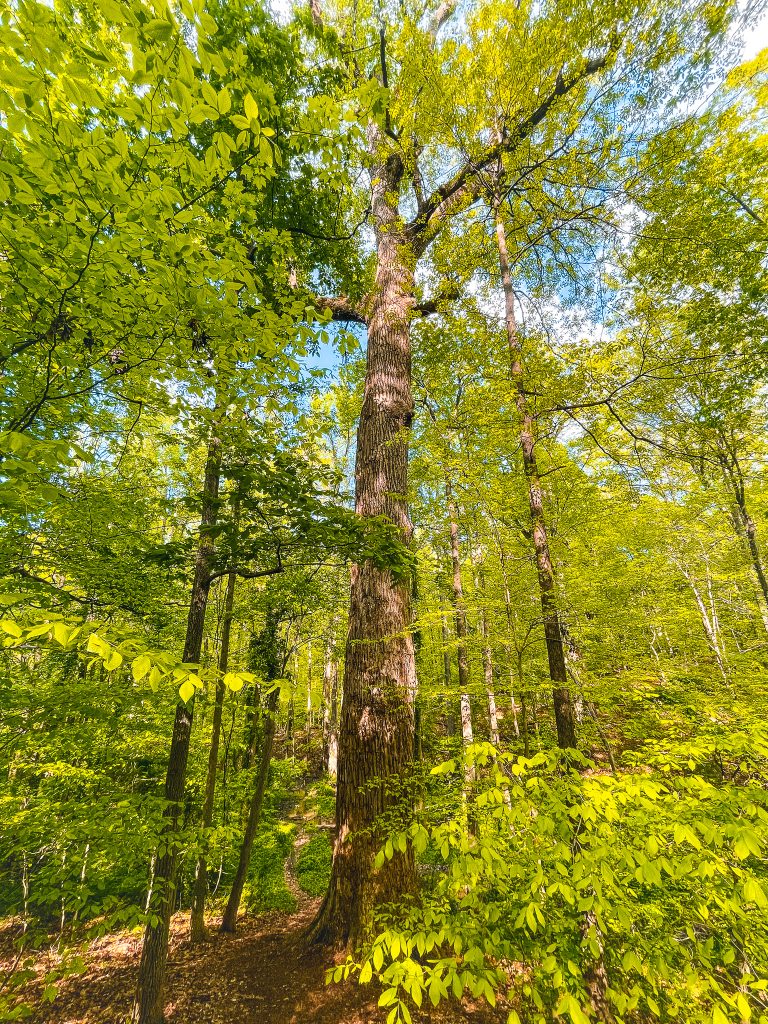
Download the transcript and discussion questions.
Discussion questions:
- In speaking about America’s history with slavery, James says, “It’s not about shaming and blaming, but it is about being truthful about what happened.” How do tendencies toward shame or blame show up with you and how do you address that in your life?
- Vina Curry risked her own freedom to ensure more enslaved people could be free. In what ways can you use your resources to liberate others?
James Shields
(singing) Deep river My home is over Jordan. Deep river Lord, I’m going over into campground. Oh don’t you wanna go to that milk and honey land where all God’s children are free.
The spirituals were point of comfort. The spirituals were also community and in some cases you can hear the anguish. And there’s a reason why sometimes people hear those songs, whether it’s spirituals whether it’s the African drums or whatever and they get nervous. Well, maybe you should be, right?
Georgia Sparling
Hi, I’m Georgia Sparling. Jon is away this week. And while he’s away, we’re going to take a walk through the woods and through history with James Shields, who you just heard from. We’re going to visit a tree. Yep, a tree. A really cool, breathtaking tree. And I’d like to ask you to join me if you’re able by walking with us as you listen in the woods, on a trail, along the beach, anywhere you can get close to nature and safely walk with airbuds. So lace up your sneakers, put the dog on a leash and let’s go.
Various
Thee Quaker Podcast: story, spirit sound.
Georgia Sparling
Let’s start out. Just say your name and kind of briefly who you are.
James Shields
My name is James Shields. I am currently the manager at the African American Culture Arts and History Center in Burlington, North Carolina. And previous to that, I worked here at the campus of Guilford College. I worked here for 20 years. I’m also an alum of the college. I got my degree in African American Studies.
Georgia Sparling
It’s hard to tell with all the buildings, but if you can imagine what they found, was a bunch of rolling farmland. And it is has been important for us to note, though, that this was land that was occupied by the Saura and Keyauwee tribes. So we just think that it’s important that the history of this area didn’t start with the Quakers. You know, the Quakers that came here to this area, what we call the Piedmont, these were Quakers that were definitely abolitionist, and very strongly so, and they came here and they began to try to convince their fellow Quakers who lived or their fellow Friends that lived on the East Coast who did own slaves — this goes against our testimony. This goes against what we believe as the Society of Friends. We believe that the light of God is in every person. And if that’s true, well then certainly we don’t enslave God’s children.
We start to walk away from the center of campus toward the woods. If you hear a little huffing and puffing that’s because I’m making James do the hard work of telling me this story while we’re on the move and while I hold a microphone in his face. As we walk, I try to take in the surroundings. Imagine it with me. If you’re walking, too, maybe stop and look around, take in your landscape.
James and I are still within earshot of the main campus, but we’re leaving it behind walking under an avenue of young trees that haven’t quite mustered enough branches to offer shade. We pass a small pond on our right with a few ducks on the shore. And I’m reminded that there are bits of history no matter where you go, even when you have no idea that they’re there.
James Shields
The lake behind us is actually a manmade lake. Some have said that they were actually at some point in this area that there were actually caves that enslaved Africans would hide in.
Georgia Sparling
And then, only a few minutes after leaving the main campus, we are enveloped in trees, poplars, pines, beech, oak. You can hear the crows, so many crows calling out to each other, no doubt announcing our arrival to every living breathing creature in the forest.
James Shields
As you see we’re about to walk into the woods. These are the Guilford Woods, or the New Garden Woods. Pretty much virgin forests, for the most part. I don’t think this area has ever really been harvested for timber or anything like that. But yeah, here we are.
Georgia Sparling
James enrolled at Guilford College because it was one of the few places in the area that had an African American studies program. He remembers, in particular, a class on underground railroad with Dr. Adrienne Israel. Dr. Israel is now retired but continues to research this topic.
James Shields
So that was probably when I was first introduced beyond just the basics that I knew. That’s when I kind of caught the bug around that same time. My friend, Santis Beatty, who was working here at the time, and he walked me back to these woods back before there was a trail, he walked me back to the tree. And then, about six months after I graduated, I got hired to work for the Bonner Center, and I was able to incorporate parts of the Underground Railroad work in to my work.
Georgia Sparling
That was more than 20 years ago. And James’s enthusiasm for and interest in the African American history in this area has only increased. In addition to his job at the arts and history center, James is an actor and director in the recurring production of pathway to freedom, a fictional story of Quakers and abolition. He also has a one man show about Frederick Douglass. What he finds is that many people are hesitant to embrace the difficult aspects of American history.
James Shields
It’s not about shaming and blaming, but it is about being truthful about what happened. And even on these tours, a lot of times, you know, we might get some pushback about who did what or how extensive slavery was and things like that. But I think we have to be diligent against folks who don’t want to be uncomfortable. That’s up to you to deal with your comfort level. But this history, it is what it is, as they say.
Georgia Sparling
There’s a lack of information about a lot of our history, and that includes the Underground Railroad, which in this area was estimated to be active from the 1820s to the 1850s.
James Shields
Many of us feel like the Underground Railroad as we know it really started hear in these woods. Start started right here. This idea of connecting to people up north money we know that was sent here, not only to help finance Underground Railroad work, but we know that there were other Quakers from the north that even helped to finance the school.
Georgia Sparling
We have now left the trailhead behind and are following a narrow but visible path through the Guilford Woods. The ground is mostly flat, covered in mulching leaves and pine needles. No one else is around. It’s just us and the crows.
James Shields
So this is not necessarily a trail that enslaved Africans and others used, though we could imagine that it was similar in terms of the look and it probably wasn’t a trail per se because if you’re a slave catcher, it’d be pretty easy. Oh, well, there’s a trail you know, let’s follow that and see what we find.
Georgia Sparling
As we walk James share stories of the Underground Railroad and the people who traversed these woods, he says the presence of the Quakers is one reason why this area became a pathway to the north. And the Coffin family, who originally came from Nantucket, stands out among these Quakers.
James Shields
Not only were they anti-slave, not only were they the abolitionists, but they put their words into action.
Georgia Sparling
He tells the story of what was possibly the very first major action of the Underground Railroad in these woods. It happened in 1819 and involved a freedman named John Demery.
James Shields
He decided to come to New Garden to live probably because of the Quakers. Here’s a place that I can come, relative freedom. I can I can, I can buy land, I can do all these things. So he comes, he gets land. He’s here for a few years, he’s got a family, all that.
Georgia Sparling
Then his former owner dies and the heirs decide that they want John Demery back.
James Shields
It’s like if grandma decides to give away a car and then you wait for grandma to die and you go back and well, I’m gonna take the car back. Doesn’t work that way. Well, back then it did. And so they came to Guilford County. They found John Demery and tied him up with the intention to take him away. We believe that another enslaved African went and got Vestal Coffin.
Georgia Sparling
Vestal already had a reputation as an abolitionist. He would even go on to become a sort of father of the Underground Railroad. While many Quakers divested themselves of their slaves or even financially contributed to Underground Railroad work, Vestal was extremely hands on and he was not willing to let this freed man be reenslaved.
James Shields
Vestel Coffin, grabbed a couple other people. Come I need you. I need you. They run to the Demery house. And even though Quakers are pacifists, we understand that that a melee ensues. Demery was able to get free. He comes here to the woods. And eventually he is known as one of the first people if not the first person to get sent on the Underground Railroad in Guilford County.
Georgia Sparling
If Vestal was the father of the Underground Railroad, than his cousin Levi was the president, which is actually a nickname he acquired because he was so active in the movement. Levi grew up in and around these woods and learned early on how terrible slavery was. He saw it firsthand. Groups of enslaved people separated from their loved ones were often seen, chained and dragged through these very woods to be taken further south.
James Shields
Levi Coffin tells a story of when he was a kid, and he would come to the woods under the pretense of feeding the pigs, when in fact, he’s coming to a place like this or somewhere else to bring food, maybe clothing and information. And Levi Coffin talked about sitting in the woods, listening to the horrific stories of slavery from these folks, but he also talked about just how they just had this faith in this hope that they wouldn’t be free.
Georgia Sparling
I’m from the Deep South, where the underbrush tends to be thick and gnarly. But here in New Garden Woods, it’s fairly spacious under foot. I still manage to trip a few times, but I can see how easy it might be to be spotted running across a flat area of the woods. And even though enslaved people escaping through here would have known that there were Quakers on the lookout for them there was no guarantee that the white guy you met in the forest was definitely the person you were hoping to see. Remember, slave catchers also frequented the woods, both looking for runaways and transporting people that they had already caught. For people trying to gain their freedom, there was just so much at risk.
It’s really, it’s really wild to just imagine people being here, you know, just to think that you’re in the same place and seeing some of the same, even the same tree that they would have gone by.
I’m trying to picture this young Quaker farm boy sitting with enslaved people. Perhaps under the tree we’re walking toward with the sound of running water softening his footfalls and both terrifying the people hidden in the caves along the creeks edge, but also filling them with hope. Like maybe this is one of those Quakers that lives around here. Maybe it’s the guy we’ve heard about, maybe he’s got food. And imagine the rarity of a white person, a white, young boy even sitting with them and listening to them and sharing his food with them, helping them get one step closer to freedom. It’s this terrifying, beautiful thing.
Okay, so I want to be cautious that in telling this story, it isn’t solely centered on white abolitionists. It’s true that there’s a lot more information about them than the thousands of enslaved Africans who came through these woods. That’s something that’s very important to James. And it’s really the heart of this story. I want to make sure that, for the rest of this episode, we get at least a glimpse of the people who risked their lives for a chance at freedom. Okay, let’s go back to our walk.
James Shields
We need to clean our sign. So here’s our tree, it’s got to be at least 100 feet tall, if not more. And like I said, there’s a vibration on this tree, that’s really crucial.
Georgia Sparling
We’re standing on a platform several yards from the base of the tree and looking down as small stream runs almost silently in front of the tree.
James Shields
But if you could imagine like this stream being a lot bigger than it is now. And as you see their little cuts in the side where the stream is. Now when there are bigger trees here, a lot of these trees that have fallen, there were root systems that you could go into and hide.
Georgia Sparling
We can’t know for sure, but it’s quite possible that enslaved people on the run tucked into the bank just below this tree. And they may have met others who are heading north. Maybe they talked to Levi or quietly worshiped and prayed in this exact spot.
James Shields
When we come out, we try to talk a little bit about the spirituals the significance of the spirituals.
Georgia Sparling
And then he starts to sing.
James Shields
(singing) Wade in the water, wade in the water, children, wade in the water, God’s gonna trouble the water.
Georgia Sparling
We’ll be right back.
Jon Watts
Hey, everybody, it’s Jon, and I’m boarding a plane to return to the United States after two weeks of visiting with Quakers all over Australia. We’ll tell you more about that soon. But I just wanted to share with you what a privilege it is to be a part of this global Quaker movement, and to be doing this work of seeking out stories of spiritual courage all over the world. It has been a lifelong dream of mine to shine a spotlight on these stories and to lift up talented storytellers like Georgia, whose episode you’re listening to right now. But that kind of dream doesn’t just happen. It takes hundreds of listeners like you to decide that this work is important enough to support and then taking action. So if you’re enjoying this episode, or if you’ve felt intrigued and uplifted by other episodes that Georgia has produced, I’d like to ask you to visit our website and become a monthly patron. A gift of $10 or $20 a month helps ensure that Georgia continues to be supported in her work of seeking out spiritually courageous voices, and telling life changing stories. So please visit theequaker.org. That’s theequaker.org. And become a patron right now. Thanks and wish me luck on this 15 hour flight. I’m going to try and get some sleep.
Airplane speaker
Ladies and gentlemen, welcome aboard American Airlines Flight number 72, nonstop Los Angeles and the United States of America. Please remember that overhead bins are shared space.
Georgia Sparling
And we’re back. We’re in the heart of New Garden Woods, also called Guilford Woods, standing under an expensive ancient poplar tree, a tree as old as Quakerism and America. James is talking and singing about the importance of spirituals for those seeking freedom.
James Shields
Sometimes we know water just meant simply less meat down at the water that’s where we’re gonna come together. We also believe that these woods kind of acted as a hush, hush arbor, right, places where you could come seeing pray worship together within the arbor of these trees and not be heard, right. So even like today, the combination of the trees and this wind. If somebody is on a slave patrol over on the other side, don’t, they’re not going to hear us. And so we can come together pretty safely.
Georgia Sparling
We are still standing under this tree as James dips in and out of the spirituals, his voice combined with the significance of this tree and of this place is more powerful than I can say.
James Shields
(singing) Deep River. My home is over Jordan. Deep River Lord, I’m going over into campground. Oh, don’t you wanna go to that milk and honey land, where all God’s children are free. Deep River. My home is over Jordan, Deep river Lord, I’m going over into campground.
It’s a song that could signify where to meet. It’s a song that could signify just a lot of things. But the spiritual is also or point of comfort. The spirituals were also community, this idea of call and response, where you could call out and hear back and you know that your people are with you. For example, you might sing a song: (singing) When Israel was in Egypt land. And then the people say, Let my people go. Pressed so hard, they could not stand. And people say, Let my people go.
So you know, your folks are with you. It was also one of the few ways of not only way to express your grievance with your situation. Some would say that enslaved Africans understood the essence of Christianity, a lot more than the folks that exposed them to it. When you consider the idea of forgiveness, the idea of faith, the idea that freedom is meant for all God’s children. That being said, we know that there were others, white Christians, specifically the Quakers and others who understood that as well.
Georgia Sparling
The songs can also have a twinge of revenge, maybe more than a twinge.
James Shields
For example, you might sing, (singing) You’re going to reap just what you sow, you’re going to reap just what you sew. Sew it in the mountain reap it in the valley. You’re gonna reap just what you sow.
This music was so important, so important. And I lament sometimes that a lot of young people don’t know this music. The way I did when I was their age, a lot of it’s missing. They don’t see what I believe is an unbroken string, from spirituals to hip hop and beyond. When you consider that the spirituals evolved into the blues evolved in the jazz evolved into you know, R&B and soul and now hip hop. And in every case, there’s an element of freedom. There’s an element of grievance with what’s going on. And there’s a reason why sometimes people hear those songs, whether it was spirituals whether it’s the African drums or whatever, and they get nervous. Well, maybe you should be.
Georgia Sparling
Okay, time for a confession. I read a lot of books, that’s no secret. But I’ve often shied away from anything having to do with the Civil War. As I said, I grew up in the Deep South, and I felt like I just do not want to talk about the war and slavery anymore. It feels like it’s everywhere. I mean, I pass the Jefferson Davis house complete with Confederate flags waving at the entrance, just on my route to the craft store. Somehow it feels like the civil War and the reality of it is kind of like pressing in like it’s everywhere, but also somehow nowhere all at once, if that makes any sense. And selfishly, it’s exhausting to think about it. And it’s even more exhausting to see how some of those mentalities really persist today in so many ways. So I don’t know about you, but James’s stories and his singing, it reminds me that what I know of slavery of enslaved people is still so narrow and still being so narrowly told. That’s one of the things that James really emphasized during our walk that I’ve been trying to take to heart ever since.
James Shields
The basic narrative of the Underground Railroad, beyond a Harriet Tubman, and depending on where you are, it’s benevolent white people, Quakers and others, helping out the enslaved Africans to get their freedom, which is true in a lot of ways. But what we’re finding now is that enslaved Africans and free blacks are so much more involved in the gaining of their freedom. Then we then then the basic narrative tells us
Georgia Sparling
Vina Curry is one example. Vina and her husband moved to Guilford County as free blacks in the early 1800s. And they bought land there. Vina worked as a washerwoman at the school that is now Guilford College. And when her husband died, she used his freedom papers to help at least 15 people escaped slavery. She made sure that the people she gave the papers to match her husband’s description as much as possible. And then they had to promise to send the papers back so that she could try to free another person. By the time Vina is doing this, Levi Coffin and his wife, along with many other Quakers have begun to migrate away from the Deep South to places like Indiana to escape mounting pressure against abolitionist. But Levi continues his work on the Underground Railroad as a receiver this time instead of a sender.
James Shields
Because we believe that those three papers that came from Vina Curry went to Levi Coffin, he would then send those papers back by courier.
Georgia Sparling
According to James, Dr. Israel’s research has shown that free black communities in the area tripled during the years that the Underground Railroad was active, and Guilford.
James Shields
That’s a huge story, just the story of free black people in the south, right, and their role in the Underground Railroad in general. But now we want to find those particular stories.
Georgia Sparling
It’s a story that still has a lot of holes, of course, because no one was much invested in preserving the stories of southern black people back in the 1800s.
James Shields
The one thing that we found is that many schools don’t teach this history. To me, there shouldn’t be a school aged kid who doesn’t know the name Levi Coffin, who doesn’t know the basic story of the Underground Railroad. And we found that a lot of them don’t.
Georgia Sparling
James recalls a class of small children, he took on a tour to the tree.
James Shields
I’ll never forget, we had first graders, right, six years old. And they’re all They’re all coming down a trail. And they all have their partners. Little white boy, partners, little black boy, and he raised his hand and said, I have a question. And it really wasn’t a question more of a statement. He says, Well, I don’t understand how people that look like me, would do would be so mean, to somebody that looks like my friend. He understood it again, it’s not about shaming or blaming. But it was important for that young man to understand that, yes, slavery happened in our country. This is how we used to treat each other. And look how cool it is. Now you guys are here. You go to the same school, all that.
Georgia Sparling
James is deeply committed to using spoken word song, drama, and of course research to bring these important stories to light.
James Shields
I think it’s important for African Americans to know why we do talk about this history a lot but it’s also important to understand that their history didn’t start in chains. But even as we were enslaved, we were still human. We still had intellect. We still had creativity, and we had a fortitude that again continues to this day.
Georgia Sparling
We’re emerging from the trail and heading back to campus. And now instead of the sound of crows, of rustling branches and crunching leaves under foot, were bumping into James’s old colleagues on the brake pathways of Guilford and contending with industrial lawnmowers that threatened to ruin the last few minutes of our audio. But the spell of the tree isn’t totally broken.
James Shields
When we talk about all of the different things that we have done as a college, reaching out into the community, working with immigrants and refugees and things like that, we can always fall back to this story about how do you treat the refugee? How do you treat someone who’s in distress? How do you treat someone that needs help? And so that’s why this story is so significant. America is a great country. I love this country. But I love it for all of it. For all of it, and we can’t just pick and choose the stuff that we want to. We just can’t do that. We have to be real about what has happened. We have to kind of take on what the Akon people in Ghana call Sankofa — this idea of looking back. That we can’t move forward until we reach back in such that history.
Georgia Sparling
Thank you so much. It was really wonderful.
Thank you so much for joining me on this walk. And thank you to James Shields for sharing this history with us. What resonates most with you about these stories? Did you learn something new? Do you have a connection to the Underground Railroad? Did you walk with us while you listen to this episode? If so, share it with us on the episode page at QuakerPodcast.com.
We’ve also got a transcript with discussion questions, information on how to subscribe to the podcast if you haven’t already, and links to learn more about James and the Underground Railroad Tree, including a link to resources for kids. Oh, and we’ve also got a picture of the tree.
This episode was produced by me, Georgia Sparling, and Jon watts. Jon also wrote the music for this episode. Thee Quaker Podcast is part of Thee Quaker Project, a Quaker media organization with a focus on lifting up voices of spiritual courage and giving Quakers a platform in 21st Century media.
If you want to support our work, you can head over to theequaker.org That’s theequaker.org. We’re a brand new project and every contribution expands our capacity to tell Quaker stories in a fresh way.
Before we go, here’s a recent comment we received on Apple podcasts, AKMB writes: Thrilled to hear our story represented so thoughtfully. I’ve been waiting for this though I’m not sure I knew it. I always loved “On Being” by Krista Tippett and wondered why there wasn’t a similarly spirited forum about Quakers, who we are and how we live our faith. It’s early to tell but maybe this is like that. Or maybe it’ll be something better. Either way. I’m excited. Thank you so much for that comment.
It’s really an honor to even be mentioned in the same sentence as Krista Tippett’s wonderful show, and it’s so encouraging to hear from our listeners. If you have a minute please do us a favor and leave a comment yourself on Apple Podcasts or the app of your choice and tell a friend.
All right, we’ll be back next week with a brand new episode.
Recorded and edited by Jon Watts and Georgia Sparling
Original music and sound design by Jon Watts (Listen to more of Jon’s music here.)
Supported by listeners like you (thank you!!)
Referenced in this episode:
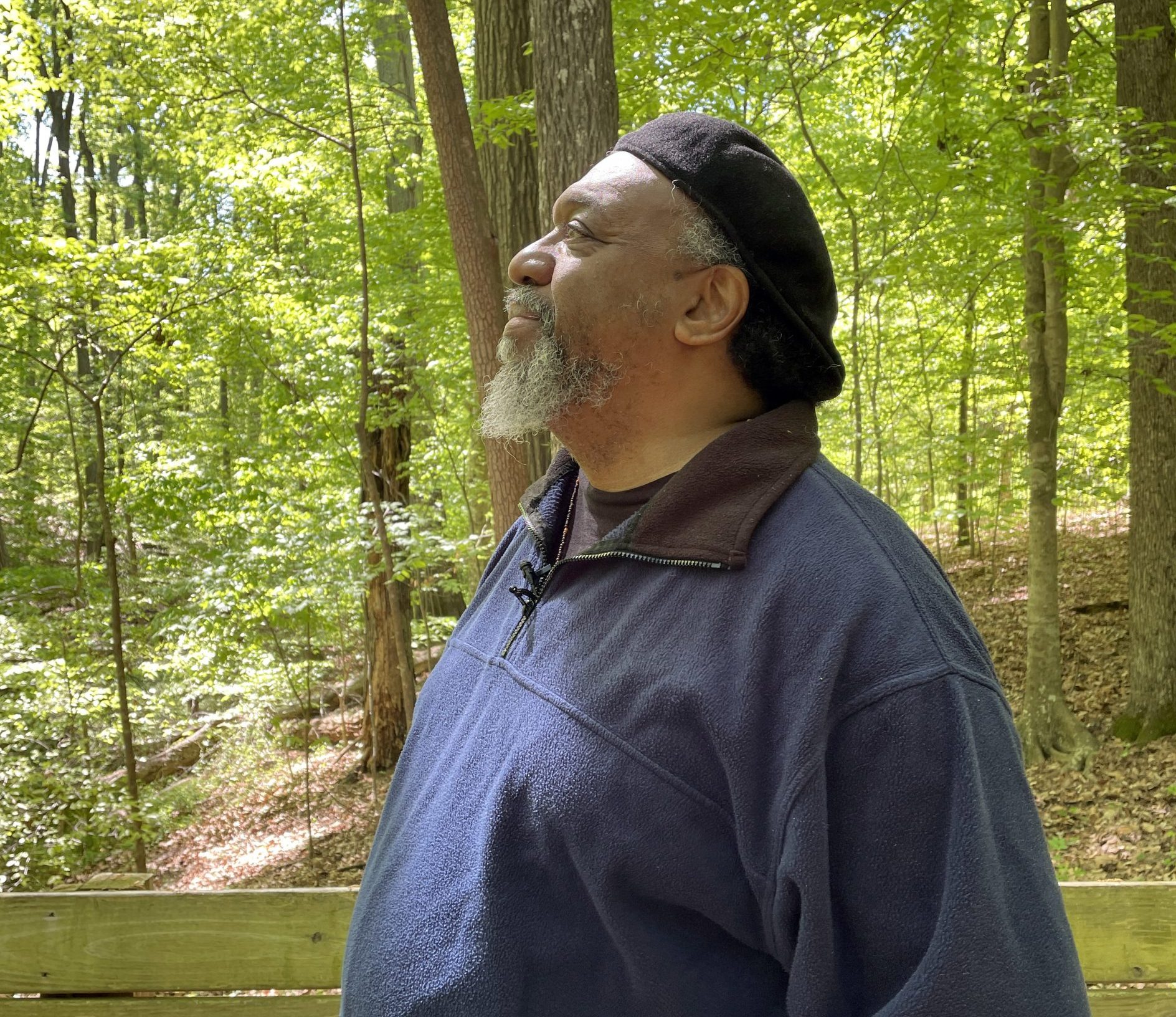
Photo by Georgia Sparling
- Read more about the Underground Railroad Tree and download resources to help your kids learn more about this history.
- Ashley recorded her vocal ministry at New Garden Friends Meeting.
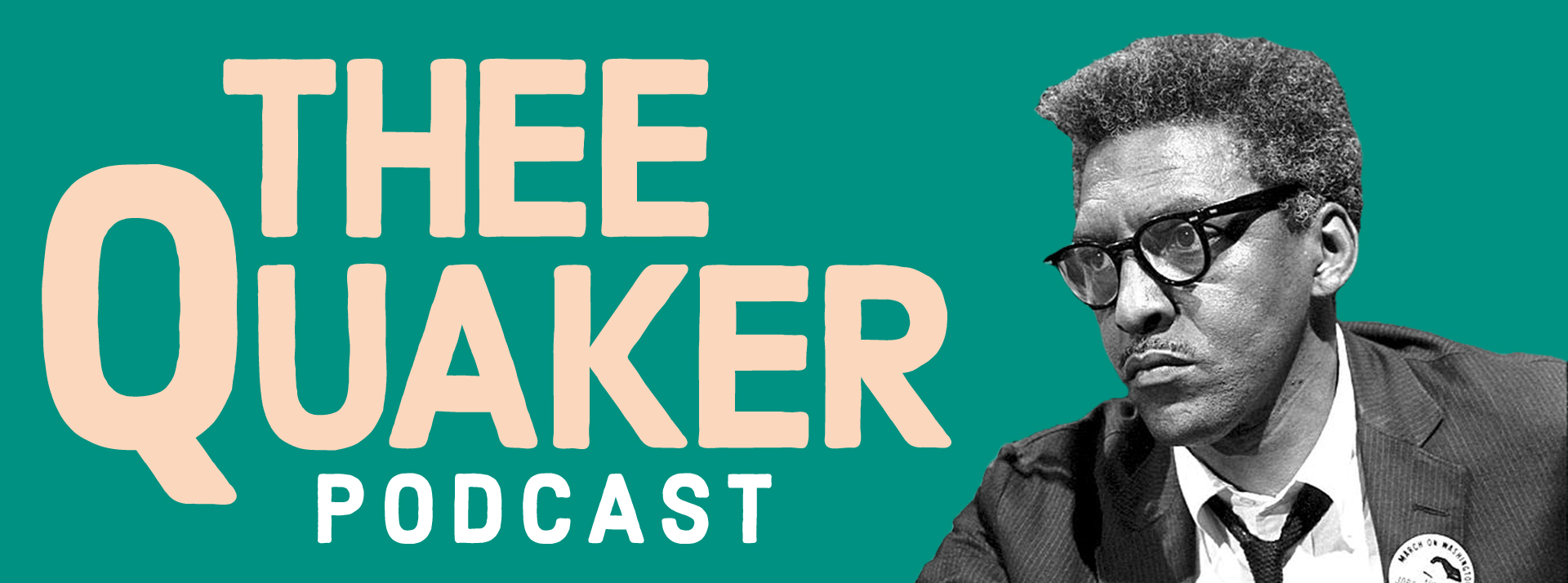

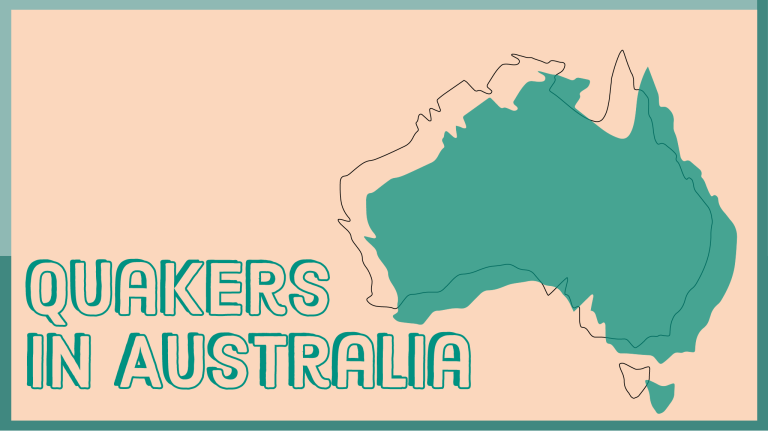
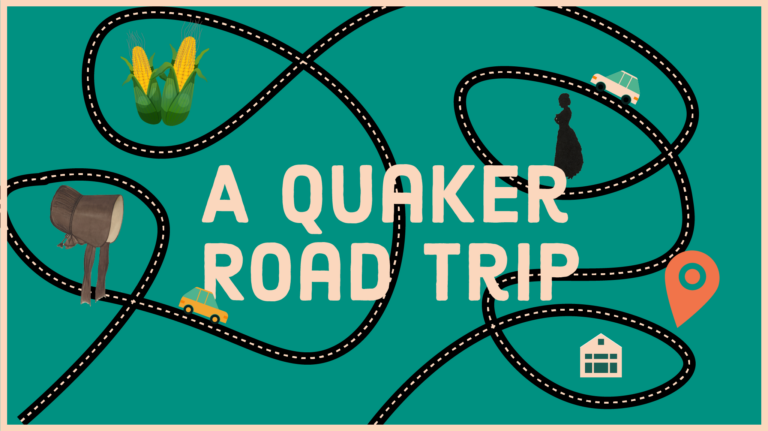
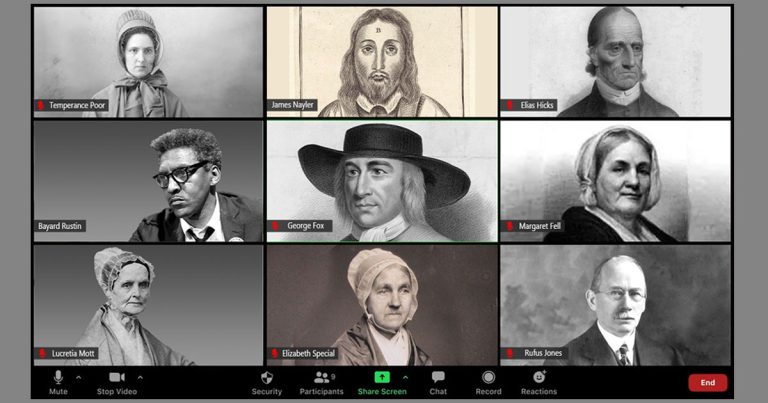
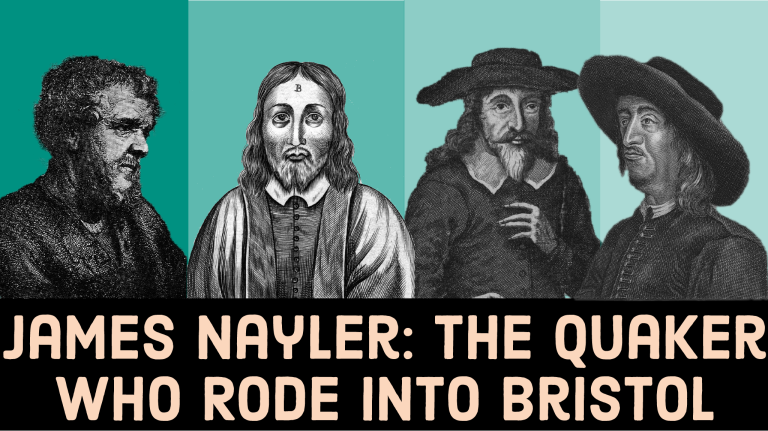
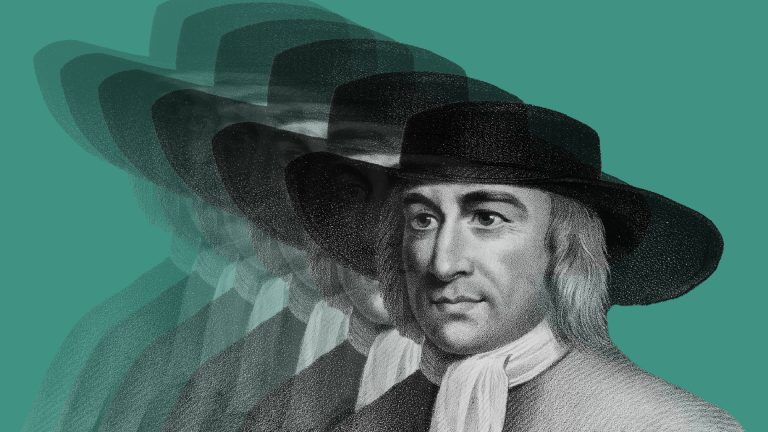
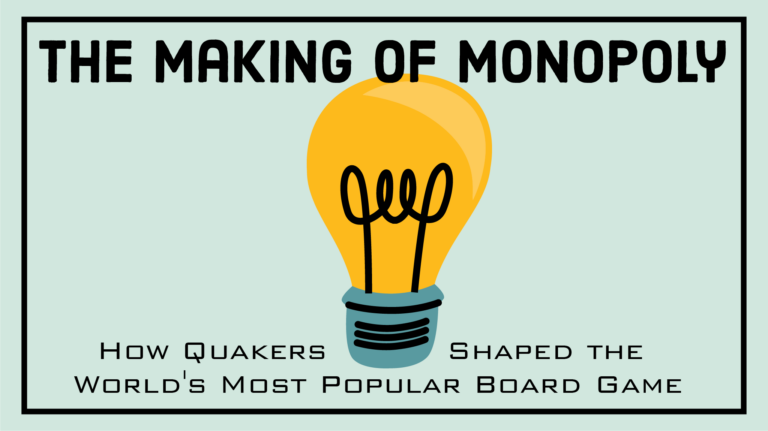
Wonderful walk with James and Georgia into the heartland of the Underground Railway. I have a personal connection to this place as my ancestors ( the Hunts and the Coffins) were part of both black and Quaker history of this place. While I have never stood within the Guilford woods, learning in later life that my forbearers did walk here established for me a solid spiritual bond. My ancestors moved from Guilford to Indiana for the very reasons many Quakers left the south, to leave behind the turmoil of the Civil War years, of slavery and neighbour against neighbour. I found my Quaker past in stories of the people who knew these woods intimately. I feel close to knowing how their learned to love one another – both black and white.
I found this very interesting, as I went to Guilford College in 1967-1968. I am not a Quaker but have always been a civil rights advocate. I knew about the Underground Railroad, but I had no idea Guilford College played such an important part of this history. I definitely want to revisit Guilford College again and explore everything you are talking about here.
Thanks so much for this episode. I’m an Australian Quaker & sometimes I lead the choir I sing in; we’re learning Wade in the Water & it was great to hear James Shields singing it and talking about its many meanings, and the other spirituals. I love the emphasis on what black people did against slavery, not just the whites/ Quakers, especially the story about Vina Curry who was widowed and washed clothes for a living and used her husband’s freedom papers to free 15 people. I love what James said about what America means to him. For Australians too – I love Australia but I love it for all of it… we can’t move forward until we reach back and fetch the history of what we did to black people here, to the Aborigines, the Torres Strait Islanders and the Pacific Islanders. Blessings, Helen
Both the Quaker Scenic Byway and the Walk to the Underground Railroad Tree touched deep chords in me. I wish I had another lifetime (I am an octo-geranium now) to study and experience all there is to know following these trails further. Diverted to Japan at the age of 7 and not returning to the United States until I was 20, I grew up with almost NO education regarding slavery in my own country and little about the Civil War, even though the railroad, I understand, ran right through or near my original home base of Yellow Springs, OH. I don’t know why I did not become a Friend when my parents Earle and Barbara Reynolds did, years later. I did find Jesus Christ soon afterwards and so much of what I love about Him is reflected in the lives of Quakers I have known. I am especially drawn to know more about “the folks who exposed” the slaves to Jesus and the Bible–and their own transmission of Christian faith, since they were often not allowed to learn to read , to hear sermons or to own Bibles. I guess spirituals were the primary means of that transmission, through references to bondage, Egypt, Jordan River, land of milk and honey., etc. So perfectly applicable and meaningful to their situation and containing comfort for their souls. I love the testimonies of the “prayer kettles” I heard about in talks the descendant of slaves Matt Lockett, and the descendant of slaveholders Will Ford III have given together .See “The Prayers of My Forefathers (Former Slavers) Echo Today, 50 Years After the Civil War.” Thank you, Georgia Sparling and James Shields!